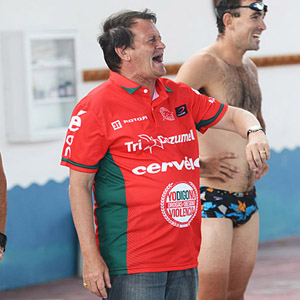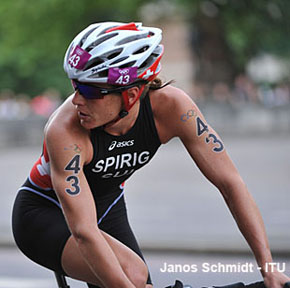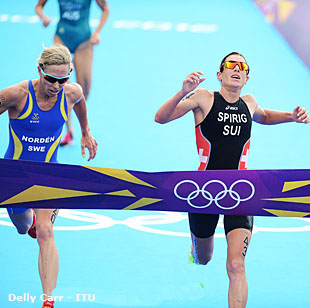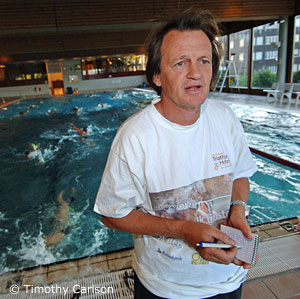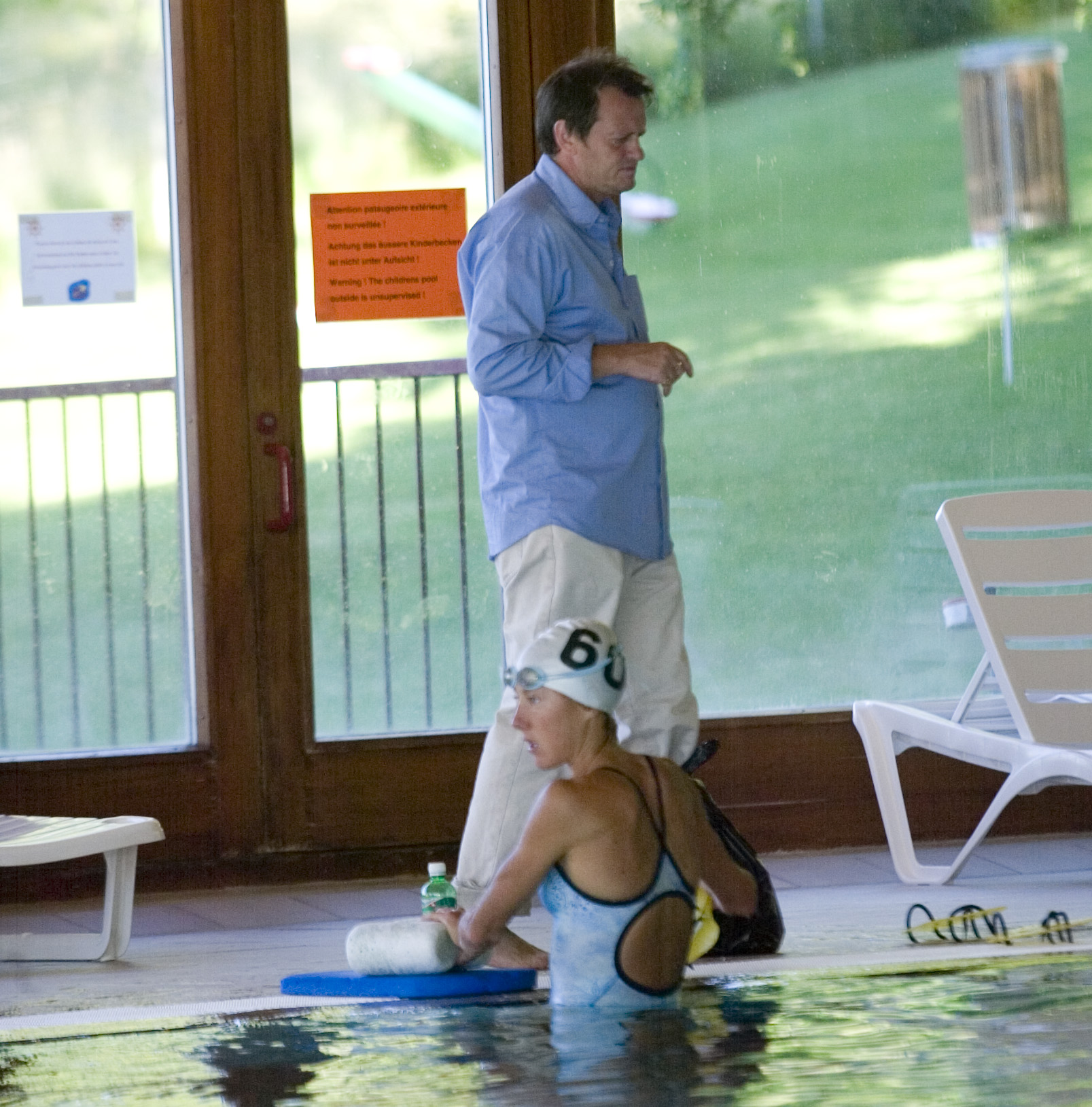Inside the Sutton-TeamTBB Split
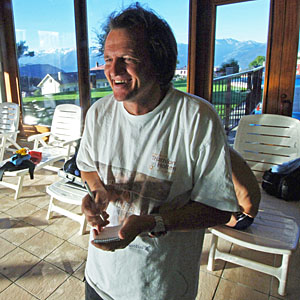
The six pros of TeamTBB who were about to race at Kona had just finished the final training block in Cozumel, Mexico under the direction of their coach Brett Sutton. TeamTBB team manager and business partner Alex Bok was optimistic when he arrived in Kona on the Sunday before the Ironman. But he was not prepared for what happened when he met with team members late Wednesday afternoon to hand out new race kits, team apparel — and some caps and T-shirts that had the following text printed on them: “Are you ready for the change?”
MUTINY!
When they saw those caps and t-shirts and that message, several athletes appeared ready to throw them away — and none left the room with them. While he knew of Sutton’s ideas for changing the sport, Bok was not aware of tensions that provoked among TeamTBB pros and he was shaken by the emotional backfire.
Sutton is arguably the most successful triathlon coach in history, and his top athletes were ready for a change all right – away from what Sutton was pressing TeamTBB to become. Why was Sutton rocking the boat at the expense of his athletes? The answers lay deep in the essential fiber of a man with great talent, great flaws, great heart and a great ego.
With increasing frequency, Sutton had been telling the world that the World Triathlon Corporation had become “all about power and profit” and were “not serving as the custodians of the sport. “ He issued Tweets which called the M-Dot an “icon of shame,” and urged all triathletes – his own pros included — to join in his crusade. In a September 27 Tweet, Sutton wrote in his shorthand: “we r not teasing ,we r genuinely going2 change tbb, i want it2 help all participants in tri not just pro,2 do what it needs – radical change.”
Sutton was proposing to create races, funded by memberships for grass roots triathletes, which would allocate much higher pro prize purses, an equal amount for an age group raffle, a tenth for social programs, bare bones for organizer expenses and zero for profits. As his athletes read the message on those caps and T-shirts, which had been ordered by new assistant coach Sergio Borges working with Sutton in Cozumel, they felt he was enlisting them in a risky Light Brigade-style campaign without their consent.
That night, Bok had dinner with TeamTBB sponsor John Cobb, who told him, “Alex, respect your athletes and all those doing this race this week and in fact respect the race itself. So don't announce anything disturbing that you are planning before the race as it will not go down well with anyone involved with this event or even outside.”
The next day, Bok asked media acquaintances their opinions. “They all said, without hesitation, ‘Alex, don’t post anything this week,’” said Bok. “It will downgrade the contents, even if it’s good.’” Bok said one triathlon media type told him, “You release and launch that sort of message during race week in Kona, we won’t report on it now or ever, no matter how good the contents may be.”
BOK HAS A HEART TO HEART WITH SUTTON
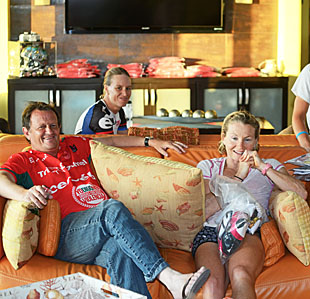
Bok told Sutton, “We are on the edge of risking losing sponsors if we do this.” As Bok recalled, Sutton replied, ‘Yes Alex I know. Fuck them if they do not… [go along].”
Sutton told Bok that conventional business models did not apply. “I told Alex I haven’t specified all the details because there is not yet a plan,” Sutton explained later. “It is a vision, and Alex and I disagreed on it. I was going to configure the team in such a way that it didn’t rely on any sponsors. Like I am telling everybody on Twitter, triathlon can make itself great by getting its age groupers and its pros to come together.”
Bok thinks Sutton is a Don Quixote. “But I would also like to protect the coaches, athletes and social programs who have come to depend on us,” he said. “I told Brett that the whole project would collapse by March without a big investor and he replied, ‘No, Alex. We have to stop this selling.’ Bok then asked him, “So what do they get for $100?” Bok recalls Brett said, “It is like a luxury ticket. A bet. A sign of support.”
At their yearly meeting in mid-August in Switzerland about the TeamTBB direction for 2014, Bok suggested that they take a video camera and record a Q&A to explain Sutton’s proposals for the future. “I was quite sure this was a much better, more engaging way to present Brett's thinking, instead of his rants on Twitter which often do more damage than good,” said Bok. At that point Bok thought it would be a good idea to eventually post those interviews on the TeamTBB website.
But by Thursday of Ironman week, Bok was convinced Sutton’s in-your-face strategy would not fly. He blocked Sutton’s race week blog and postponed plans to release the video interviews on the TeamTBB website. Sutton told his longtime friend and partner: “You ruined it, mate.”
Sutton and Bok took some time to cool down, but their courses were set. On November 1, they issued a joint media release announcing Sutton was resigning as head coach. “It seems that my constant harping of WTC is causing discrimination towards the athletes and causing disharmony within the group,” Sutton wrote.
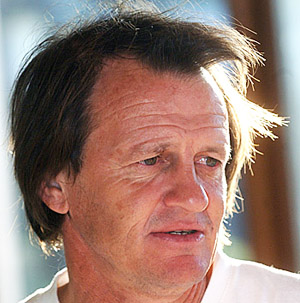
MYSTERY MOTIVE
Why was Sutton taking on the role of triathlon revolutionary? And why was he impelled to do it at that moment and risk dismantling what he had built with his TeamTBB athletes, fellow coaches, sponsors, and a partner who shared his idealism and brought major league business acumen to the team?
Bok believed he knew a key to Sutton’s urgency: “For the last two years, Brett’s health has deteriorated. Doctors have told him to stop dealing with the high pressure of frontline coaching. But it is tough. It is like asking a really gifted acrobat to stop performing at the highest level and now be a clown at the front door.”
Sutton confirmed that he had been ill but he was rebounding. “I am sick and people know that. I have had two bouts with cancer – testicular cancer which I had operated on, and prostate cancer. Doctors told me I should stop training athletes and rest and recover. But all I did was more and more. That is fine. I am not like other people. I don’t think sitting on my ass is going to make me better. “
Common sense would say Sutton had “zero chance” of success tilting at the WTC windmill and was indulging grandiose impulses. A counter theory might be the words used to describe some of novelist William Faulkner’s stubborn protagonists: “There are some things we ought to be against: Not to get our names in the paper or to make money, but because they are wrong. There is an element in the human spirit that wants to do good and to be right and elevate people and civilization.”
Call him a misguided misanthrope with a messiah complex, but Sutton is one of very few willing to loudly protest against powers he thought were eroding the sport. And he was gutsy enough, some would say self-destructive enough, to put everything on the line to do something about it.
“I am a visionary,” says Sutton. “I think I am able to say that if you look at my results.”
A COMPLEX MAN WITH A CLOUDY PAST
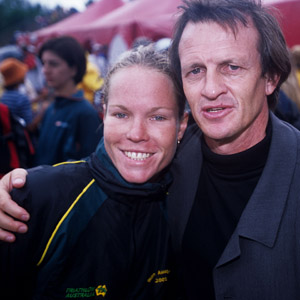
Despite his record as a coach, Sutton has rafts of critics who question his motives, pointing first to the dark cloud that hangs over him for his one great sin – the 1988 incident to which 11 years later he pled guilty and received a suspended sentence for having sexual relations with an underage girl he was coaching in an Olympic-level swimming program. Since then Sutton has incurred no other such charges and has won strong loyalty from dozens of elite athletes.
Critics see Sutton in a cynical light. They say he over trains and over races many athletes to the point of injury, then reaps the benefits of a few strong enough to survive. A majority of his athletes disagree and say he has a protective sense of each individual’s physical limits and actually cuts back on the workload of several champions. Some say he started as a big time Olympic swim coach and has always been motivated by greed to accumulate more world champions. A glance at the modest circumstances of his life with his wife and two youngest children could dispute that observation.
In part, Sutton’s new vision raises resistance because it appears to bypass the usual way business is done. Non-profit? “I’m about doin’ nothin’ but explaining to people that triathlon does not have to be run by corporates,” Sutton recently wrote on Facebook, which offers him a longer, gentler platform to express his views. “It does not need sponsors and it don’t need mainstream TV to succeed. All of the above have been involved in one form or another over the last 20 years and have turned the sport from an all-inclusive health and fitness phenom[enon] into an elitist rich man’s or woman’s play thing.”
SUTTON WANTS TRIATHLON TO RETURN TO A SIMPLER TIME
Sutton was communicating via Skype in Cozumel, hoping to debunk rumors that he was into the tequila and correct misconceptions about his methods and goals.
“The rumors are quite unfounded,” he said. “Half the people are saying, ‘What’s wrong with you? Are you drinking?’ I’m in full control of all my faculties.” Sutton plunges ahead. “People on the outside don’t understand. Do you know what the problem is here? Because I happen to be a genius coach, everybody thinks I am only interested in training the next world champion. People think I have a big head. But I can't help it if I can prepare people better than everybody else.”
Sutton says glory and money were far from his mind when he came to triathlon in the early 1990s. “I had six people on the Australian national swim team and a guy at the pool was looking after a group of guys training for triathlon. When he went away for six months, he asked me to look after them.”
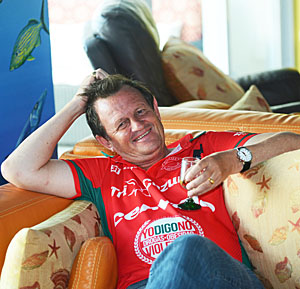
The triathletes were a sharp contrast to the swimmers. “These guys were between the ages of 30 and 55 and were all shapes and sizes,” said Sutton. “They couldn’t swim for shit, but they were trying their best. I loved the camaraderie. I had them do silly races where they’d swim off the beach, run up the sand to their bikes and come back and run. Nothing organized. Then I started training some kids on the side of the pool, putting them on turbos while working my national squad.”
National swim team honchos told Sutton to ditch his triathlon kids. Unabashed, Sutton said, “Judge me on my results!” and felt he had answered the doubters when his swimmers performed well at the nationals. Nonetheless, Sutton was told: “Make your choice – these bike riders are never coming back to the pool.”
“Of course, me being me, I just held two fingers up, turned around and walked out,” he recalls. “As I was leaving, I said ‘OK, I’ll go to the triathlons.’ Two days later, my Mrs. walked out because all of a sudden I was back with nothing. No job. No income. And the oldest guy on the team was 16.”
Sutton recalls that “everybody thought I was a joke because I tried lots of new things. And that’s when I fell in love with an extremely great community sport that gets average people to have a good time staying fit. I suppose that is what it’s all come back to now.”
While his triathletes earned 5 ITU Olympic distance World titles from 1996 through 2003, and an Olympic bronze in 2000 and silver in 2004, Sutton says he was happiest working with those first grass roots guys. “We formed a triathlon club and put triathlons on to help pay me and help kids go to big races,” he recalled. “After the races we had a big barbecue and all sorts of drinking. It was a lot of fun. We’d split up the money from the entry fees — so much for the club, so much for professionals and we put up money for age groupers. Basically everybody got looked after because nobody was looking for a big profit.”
THE PARTNERSHIP
After his resignation, Sutton and Bok say their bond is unbroken.
Bok was born in Holland and worked 17 years for the international division of Rabobank before becoming a managing director for the largest bank in Southeast Asia. Inspired by his wife’s embrace of Buddhist philosophy and her caring for terminally ill cancer patients at a hospice, Bok took a look at his profession and didn’t like what he saw.
“I was involved in a $50 million dollar deal between an Indian finance company and our bank where we were urging people who could not afford them to take on loans to buy cell phones and fridges.,” said Bok. “Our company thought it was a gold mine because we had $330 million in loans at 35 percent interest. Finally I realized we were robbing people.”
In December 2005 he left the bank and started The Bike Boutique.
Bok, who was an amateur cyclist and triathlete, saw a strong market in Asian big city bankers and finance professionals who wanted tools for a healthy lifestyle. His first bike and multisport store in Singapore took off and Bok quickly expanded the brand throughout Asia and ultimately Europe, Australia and the US. Early in 2006, he decided that his brand needed a billboard in sport and was introduced by a friend to Brett Sutton, who had a squad based in Switzerland which had a training block in Asia.
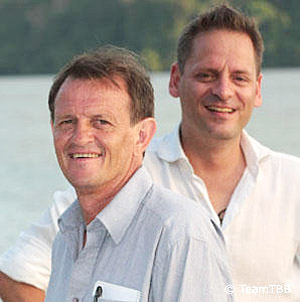
Bok asked Sutton to come to his store and talk to the customers. “He would tell them, ‘You guys all read these bloody magazines. They are all bloody bullshit! They are all crap!’ But he would do it in an entertaining way. Brett puts a value on honesty and integrity. Second, he is much closer to being a communist than a capitalist. He saw in me the converted banker and thought: ‘Converted bankers are very dangerous people. They bite their old species.’ In a way he sees me kicking against the system he never believed in and respected me for leaving that comfortable money.”
Sutton puts it this way: “I thought Alex and I would have a great personality together. My strengths were his weaknesses and my weaknesses were his strengths. And it worked out quite good.”
When they discussed plans for The Bike Boutique triathlon team, both men agreed on certain points: Ten percent of revenues would be devoted to social programs in countries where they set up training camps. The initial training squad numbered two dozen and included a wide range of talent from international Ironman stars to down-on-their-luck pros and developmental athletes. Every athlete chosen would earn a base salary. While top athletes would get a larger share, the most humble athletes would also get money every month they could count on.
Sutton and Bok also agreed that 60 percent of team revenues would go to the athletes – and athletes would get their guaranteed share first and off the top. Bok and Sutton were to get 10 percent each, but that often was put on hold or cut significantly because of shortfalls. Even with the surprise success of Chrissie Wellington in 2007 and 2008, the young team went in the hole without a full roster of sponsors. “Team TBB in 2007 was risky,” said Bok. “In the first three years I paid out a total of three quarter of a million dollars to keep it going.” After the world economic crisis started to put The Bike Boutique stores in the red, he sold most of them in 2009 and used to money to “save the team.” After that, Stephen Bayliss won an in-house contest to rename the squad “The Best you can Be” was TeamTBB.
SUTTON’S BEEFS
Sutton says he does not criticize WTC CEO Andrew Messick on business principles because, as he says, “The WTC is not operating as the guardians because it is not a sport for them – it is a business for profit. When you get 100 pro athletes to come race for $25,000 why should they offer a million? They shouldn’t! That is the nature of business.”
So who’s to blame? Surprisingly, he points the finger at pros.
“Mate, our people who went to Kona couldn’t get their head around my new business proposal because they are like all the other triathletes,” said Sutton. “That’s why I am upset with ‘em. I took them from nothing. There is nobody there now except for Jodie Swallow who were any good when they started with me. The rest were washed up or just starting out. And as soon as they get enough money, they do exactly as everyone else does. When they start to get what they think is decent money, they become the enemy.”
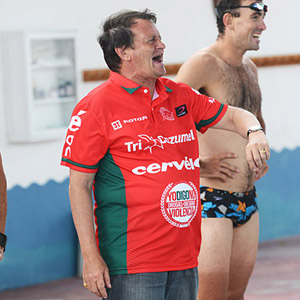
Sutton says that pro triathletes failed to take the type of unified action which broke the salary caps and opened free agency in major US sports. Sutton points to tennis players from Australia who led the way in the 1960s to get from poverty-level amateurism to the multi-billion dollar professional era of today. “I talked to one of the guys who were a part of the tennis breakaway back in 1964,” Sutton said. “He told me, ‘Mate, out of the top 32 players, 17 of us were Australian. We were having a beer one night and we all said ‘We are were sick of this shit. Let’s form a professional tour and tell em to fuck off.’ Then the top guys said, ‘You know what? Let’s pay ourselves all the same money.’”
The man told Sutton that top players like Ken Rosewall and Rod Laver agreed to take the same base pay as the journeymen, but if they got a bit of extra money we they would will put it into it second third and fourth place finishers. “Laver would go to exhibitions and beat me 6-love 16 matches to zero,” said the man. “And you know what? I took home the same base check.’”
Sutton said pro triathletes will never take a stand. “Over the past 20 years, I’ve sat in four meetings aimed at getting the pro triathletes to form a union,” he said. “The same thing happened every time. The top 10 guys said that would affect their money and walked out.”
Sutton rails at critics he claim that he, too, is in it just for the money. “Hey, if I was just interested in making money, I wouldn’t be in triathlon,” he said. “When I was in TeamTBB, I was making half less money than I could have. But I didn’t move because I wanted to change the sport. When I realizes that TeamTBB was becoming this team where results were more important than changing the sport, we had to part company.”
Sutton laid out a guerrilla tactic: “If triathletes they just woke up, got together, and said ‘We are a unified group. You don't pay us, we don’t race.’ All they’d need is for the next four races, the gun goes off and then they get out of the water and quit the race. The WTC would either change and pay them some money or,” he admits cheerfully, “they would say ‘No more pros.’”
Sutton says risks are worth it. “The pros think they are helping themselves by keeping quiet and settling for scraps,” he said. “But they are killing themselves.”
WHAT HAPPENED AT KONA
As might be expected, TeamTBB athletes did not have their best days. Jodie Swallow was well placed after a 54:01 swim and 4:55:53 bike but dropped out on the run. Mary Beth Ellis struggled through a 58:44 swim and biked 5:03:38 before dropping out. Caroline Steffen was well placed after the bike but fell back with a 3:11:55 run and finished 5th. James Cunnama surpassed predictions and took 4th – 2:22 behind 3rd place Sebastian Kienle – but Sutton thought he had a chance to do more.
Afterwards, Sutton offered some tough opinions about Kona race strategies. Tired of old criticisms that he wore down and overly controlled his athletes, he also offered a spirited defense of his methods and motives.
“They say I raced Caroline Steffen too much,” said Sutton. “Well, she missed her feed bag [at special needs] and had a bad race [finishing 5th]. But she still went home with $120,000 this year. I know five other girls who did two long races all year and had a problem of a flat tire in our stupid sport’s biggest race. And they went home with nothing this year. So is it my way to put my athletes’ whole existence as a professional on the line to be ready for Kona? Not in a million friggin’ years! If Caroline had not done four Ironman races, there was no money.”
Sutton went on: “Did Caroline get her race wrong? Yes. Had other things affected her? Yes of course. Her man she loves to death [David Dellow] couldn’t do the race. I think that affected her hard. She is a very emotional girl. She also decided she had to have people around her. She had managers there. Every year I advised her to have nobody around because that's how she races best. When she has other people on her mind, she is 20 percent worse.”
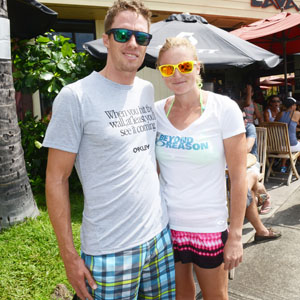
As for James Cunnama’s 4th place finish, Sutton thought the South African sold himself short. Sutton said, “James had a bad race. He should have won.’ He was saying, ‘My chiro[practer] got me 4th!’ I say, ‘Your chiro DID get you 4th!’ An opportunity opened up because [of a following current] so [the top swimmers could not break away] and the race was there to be taken. James found himself in the place where he could have stolen the race like Chrissie [Wellington in 2007]. But he didn’t convert because he was frightened he was gonna break — because that’s what his chiro kept telling him in training.”
Cunnama denies he talked with Sutton after the race. “I have effectively had no communication with Brett since Kona race day. We have not discussed how the race unfolded, my own challenges during the race, or my feelings post-race.”
Cunnama added, “I feel it is probably best to remain silent and let Brett's rhetoric speak for itself. He seems to have a self-destructive tendency which appears to reach its peak following his successes.”
Sutton’s strongest4 feelings were reserved for Mary Beth Ellis, a favorite he calls the Honey Badger for her relentless determination. Ellis raced despite a September 9 bike crash which left her with a broken collarbone. “Yes I fell out with Mary Beth,” Sutton said. “Should she have raced? Never in a million years! I told her, ‘I’m afraid you had an operation. Your body will not be ready. Let's heal and come back here next year.’ But she went home and listened to all the idiots [saying] ‘Aw come on! You can do it!’ You think I didn’t cry at night thinking, ‘This girl is going to go out there and ruin her career listening to everybody?’ It killed me!”
Ellis was gracious. “As usual, Brett was right as he has been so many times with me,” she said. “I should not have raced, but at the same time, focusing on getting back for Kona did help me stay positive and moving forward rather than feeling sorry for myself after the accident.”
PARTING OF THE WAYS
Ultimately, the businessman loves the coach but could not follow him over what he saw as a fiscal cliff. Bok did his best to remind Sutton of first principles that concern the heart and not the bottom line.
“I come from the corporate world and know what corporate bastards do,” said Bok. “When Brett sees these things, he gets angry, sour and filled with resentment for his athletes, so the athletes are angry with him. He gets angry at sponsors. They all get mad at him.”
After making a 14-page financial analysis of Sutton’s plan, Bok told him the numbers did not add up. “No matter how much I would love to continue and back up Brett’s vision, fighting to see how we can take the sport out of the hands of private equity investors – I can’t do this. You can have the David and Goliath story only if David has the weapon to beat Goliath. If not, he will be crushed within 5 minutes.”
Bok told Sutton he to get 2,000 members paying $100 within six months to proceed. “You must replace sponsors you are driving away who made us a million dollar team,” he said. “You tell the market, the industry and consumers we will change the world and then you want your athletes to jump with you. But the moment you jump off the cliff, there are only two options: You hit the rocks below, or you suddenly land on the back of a flying horse and we go to La La Land in a dream.”
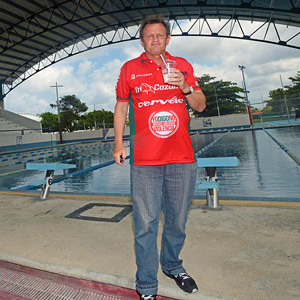
Bok told Sutton that such a radical transformation of the blueprint for TeamTBB would take time and it would work best if it evolved into an organization like the Green Bay Packers where people in the community buy shares of the team and become stockholder-owners.
“I told Brett, ‘You are two years too early, unless you have some business people who will promise you $10 million to finance the process,’ “ said Bok.
“He told me, ‘I don't have that. And I haven’t got time.’”
Bok then struck a nerve.
Bok told Sutton, “Brett, you have been a coach for thousands of athletes. After seven years for once let me coach you as a friend. Maybe it is time you forgive yourself for the past. And if you can finally forgive yourself, you can let go, move on and you can operate out of love. If you cannot forgive and forget, your heart will be filled with hatred, not love.”
Bok said TeamTBB will continue to help struggling pros and dedicate efforts to help children in the Philippines and Mexico with social programs. “I am going to stick to our original mission statement,” he wrote in an email to Slowtwitch. “And nowhere in that statement does it say we are going to do events. It does not say we don’t like what WTC is doing. I agree that the WTC squeezes pros and they treat profit margins as the primary goal. There will come a time when something has to change.“
Sutton sticks to his vision. “I want the age groupers to understand that there is another way,” he told Slowtwitch. “I think we need to go back to how we used to be and start again. I envision sometime in the future I’ll have four races [with million dollar budgets] around the world and you won’t need to go through WTC with TeamTBB. Alex needs to go that way to make the team now, which is fine. But I would not fit unless we changed TeamTBB dramatically again. And that cannot happen.”
GOING FORWARD
Alex Bok has been putting out fires, mending fences and signing athlete and coaches to keep TeamTBB rolling. Bok said he has attracted new corporate sponsors who “believe that TeamTBB with or without Brett Sutton can survive.”
Bok says the split is amicable. “This is with Brett’s blessing,” he said. “He remains our friend and his DNA will remain part of TeamTBB forever.”
Sutton says, “I am not taking anybody out of TeamTBB. If Alex can find the sponsorship, he will have the team going, no doubt about it.”
Bok says “Do not underestimate Brett. He knows “The Art of War” [by Sun Tzu] by heart. The book says “Do not go into battle unprepared.” Brett showed me that principle in action time and again.”
Bok plans to shrink TeamTBB’s 2013 roster of 38 professionals, organized in different country teams, to about a dozen in one global team for 2014. Sensing correctly that Sutton is irreplaceable, Bok gives his pros the freedom to pick individual coaches. “I offered contracts and spots on the team to three German athletes, two Belgian athletes, two Dutch athletes, two American athletes, one Aussie and one Asian athlete,” he said. Bok added that one of the six athletes who competed at Kona this year might stay.
It was Mary Beth Ellis, who signed to remain with TeamTBB for the 2014 and 2015 seasons. She will join coach Siri Lindley’s powerhouse squad, which now includes 2010 and 2013 Kona winner Mirinda Carfrae, 2012 Kona champ Leanda Cave and multiple Ironman winners Rebekah Keat and Yvonne Van Vlerken. Ellis chose to return to Lindley, who was coached and mentored by Sutton, because they both live in Boulder. Ellis said she needed to work in person with a coach on a daily basis. Lindley operates with a highly talented squad the way she trained with Sutton and it works very well.
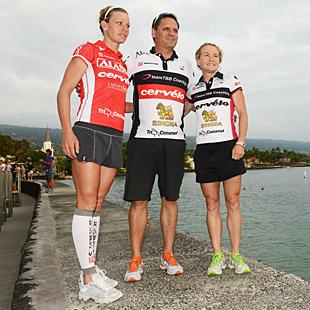
Ellis remains grateful to Sutton and Bok. Among her many coaches and mentors, she said “Brett Sutton stands alone. Over the past 3 years, he has transformed me into a better athlete and person. I am eternally grateful to Brett and TeamTBB for the opportunity to work with one of the greatest minds in our sport.”
On November 15, James Cunnama and Jodie Swallow announced they were leaving TeamTBB. The media release by Alex Bok contained quotes from the two that were unfailingly positive about their years with TeamTBB and were generous in their thanks to Sutton. At the same time, TeamTBB announced they were ending their 7-year relationship with major sponsor Cervélo – another sign that Bok has a lot of rebuilding work on his plate.
Presumably to support his family while he pursues his dream races, Sutton has formed TriSutto Coaching and will continue to work with athletes – on his terms. “At the moment, I intend to coach Nicola Spirig but I have to deal with the Swiss Federation,” he said. “I just told Nicola that if she doesn’t organize her life to be in the best possible position to have another crack at winning the Olympics, I won’t be coaching her. I told Reinaldo Colucci (who has worked with Sutton for years) the same thing a few days ago. Any athlete from now on that trains with me will not be under the TeamTBB contract, where I had to be nice to them. They will do it either my way or the highway.”
Sutton makes no excuse for his insistence on having the absolute control of his athletes.
“What people don’t understand is I’m a coach,” he said. “People come to me because they can’t do it on their own. So does that make them weak people? That makes them intelligent people. I deal with top people all the time. But in their DNA, they have flaws. [Olympic champion] Nicola Spirig had a flaw. Siri Lindley [2001 ITU World Champion] had a flaw. She would be the first to tell ya. Well, I didn’t fix those flaws. But I helped them overcome it. So I don’t need to respond to criticism like that. I’ve had girls in my squad for the last 10 years and they never complain. I’ve never seen anybody complain until they stopped winning.”
There are exceptions. Multiple Ironman 70.3 winner Angela Naeth spent a short stint with Sutton and incurred an injury from which it took her a year to recover. “Brett was tough,” recalled Naeth, who worked with him in 2009. “He was your best friend one day and your worst enemy the next. I feared him and don’t see this as a good coach-athlete relationship. I know he wanted the best for me, but it was a tough situation that led to me pushing too much and to him assuming I was over-thinking the pain I had in my leg – which further made me not listen to my own body.” Sutton says that Naeth also listened to conflicting advice which hampered their communication. But he admits, “I make mistakes,” and says he shares in the blame for Naeth’s injuries.
When Caroline Steffen announced she was no longer part of the TeamTBB unified sponsorship, she said she could not answer whether she would continue to be coached by Sutton. Would Sutton agree to coach her?
“She didn’t do what I asked this year,” said Sutton. “That was her business. From now on you do what I ask or you don’t. See, that is the beauty of not being with TeamTBB. You want to listen to somebody else? Good. I don't share that shit. That is where I got a bit weak in my time with TeamTBB. I had people listening to chiros. I had people listening to nutritionists that know better than me. I had people listening to managers. Well that’s fine. So you know what? I’ll give managers Dave Scott’s email address. No problem for me whatsoever. There are great coaches out there. Just ask ‘em. I got no problems.”



